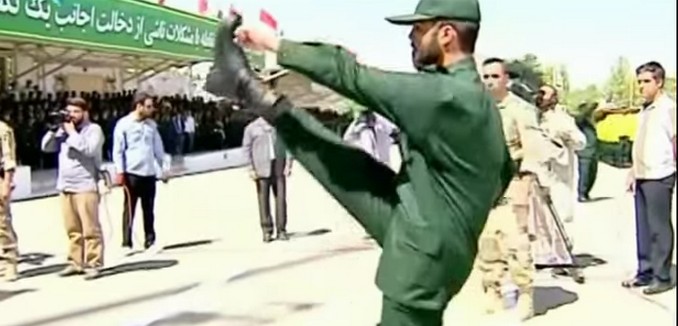The recent nuclear deal with Iran will strengthen the hold that the Islamic Revolutionary Guard Corps (IRGC) hold over the country, Lee Smith, a senior fellow at the Hudson Institute, wrote in the current issue of The Weekly Standard.
Insofar as the sanctions regime strengthened the IRGC’s hold on the Iranian economy, it merely underscores the privileged place of the IRGC. Sanctions remind us of basic economic facts—namely, that nations, like individuals, prioritize their needs, like guns and butter, for instance. Nothing focuses the mind like economic hardship, since it compels us to make stark decisions regarding the allocation of vital resources. Our choices reveal our priorities.
The reason that the IRGC got stronger under sanctions is because Iranian decision-makers cared less about the health and survival of other institutions than this one. The growing economic power of the IRGC is key evidence that this is the institution that the regime believes it can least allow to suffer. After all, the IRGC is not only in charge of the nuclear file, it is also the organization that defends the clerical regime against potential popular unrest, like the 2009 Green Revolution that may have toppled Ali Khamenei had the IRGC and its Basij auxiliaries not put it down violently.
Those same instruments—i.e., guns and proximity to state power—are also what put the IRGC in position to take advantage of a bad economy. Who was capable of challenging what amounts to an organized crime racket that, thanks to the regime’s support, also enjoys the legitimate monopoly on violence? It is doubtful the bazaaris and other businessmen were tempted to risk conflict with the IRGC since it would have meant almost certain imprisonment or death, and at best an open war that the IRGC would invariably win.
The State Department designated the IRGC for sanctions in 2007 due to “proliferation activities and support for terrorism.”
Mehdi Khalaji, a fellow of the Washington Institute for Near East Policy, has described the IRGC as “a military force with naval, air, and ground components organized in parallel to the conventional Iranian military, the Revolutionary Guards are the spine of the current political structure and a major player in the Iranian economy.” Khalaji added that “The IRGC is a major obstacle to democratization and economic privatization” in Iran.
The IRGC spearheads Iran’s efforts to spread its influence throughout the Middle East. IRGC forces have been reported in Syria supporting the regime of President Bashar al-Assad, and in Iraq organizing Shiite militias. Earlier this month, it was reported that representatives of Hamas and Hezbollah met with IRGC commanders in Beirut.
[Photo: Manuchehr Lenziran / YouTube ]




